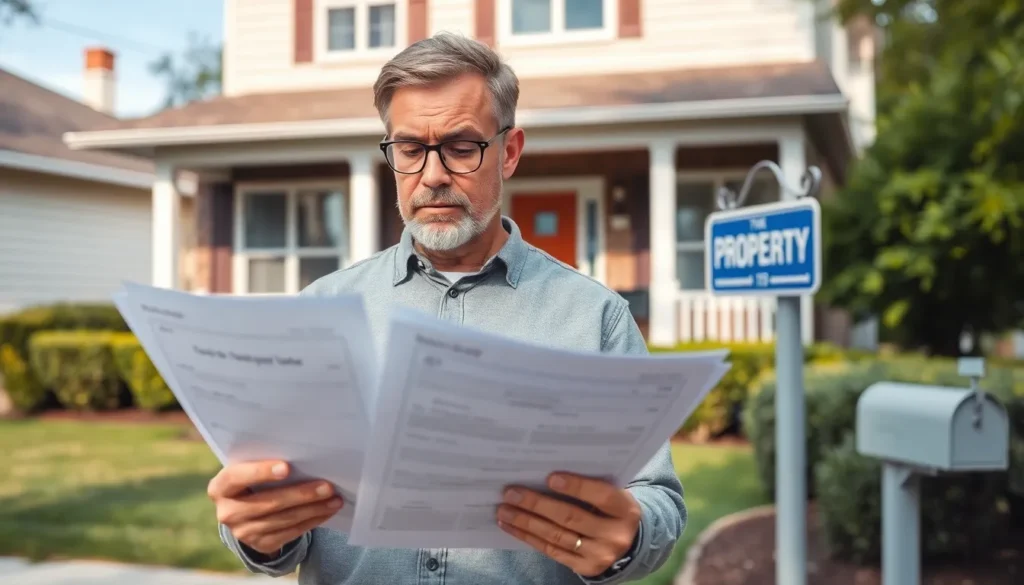Table of Contents
ToggleProperty taxes can feel like a sneaky ninja creeping up on homeowners, quietly slicing away at their hard-earned cash. But fear not! There’s a way to fight back and reclaim that money. Learning how to appeal property taxes might just be the most rewarding DIY project you tackle this year—no hammer or nails required.
Understanding Property Taxes
Property taxes serve as a primary source of revenue for local governments, funding crucial services such as public education, infrastructure maintenance, and emergency services. Homeowners contribute a percentage of their property’s assessed value, which varies depending on jurisdiction and local tax rates. Accurate property assessments reflect the market value, ensuring homeowners pay a fair amount.
Assessments can differ, often leading to discrepancies. Errors in property size, condition, or zoning can skew these valuations. Homeowners should review their assessment notices carefully, checking for mistakes that could inflate their tax liabilities. Understanding these assessments is vital to identifying cases for appeal.
Many homeowners underestimate the impact of property taxes. A significant rise in property value can lead to higher taxes, even if a homeowner’s financial circumstances don’t improve. Tracking local market trends helps gauge whether an assessment is reasonable.
Appealing property tax assessments requires gathering relevant evidence. Comparable sales data, photographs of the property, and recent appraisals serve as effective tools. Familiarity with local regulations and deadlines ensures homeowners submit their appeals correctly and on time.
Results of successful appeals can yield substantial savings. Reducing property taxes frees up funds, allowing homeowners to allocate resources towards other priorities. Armed with knowledge about property taxes and understanding the appeal process empowers homeowners to take action against inflated assessments.
Reasons to Appeal Property Taxes

Property tax appeals can lead to substantial financial relief. Understanding common grounds for these appeals helps homeowners build a persuasive case.
Common Grounds for Appeals
Assessments often contain errors that homeowners can contest. Common mistakes include inaccuracies in property size, condition, or zoning classification. Market trends also affect assessments; if property values decline, taxes should reflect those changes. Lack of uniformity in assessments among similar properties often serves as a valid basis for appeal. Comparisons with nearby homes offer tangible evidence that can strengthen an appeal. Homeowners should gather data such as recent comparable sales and property conditions to support their arguments effectively.
Importance of Accurate Property Assessments
Accurate assessments directly correlate with fair taxation. Overestimations can financially burden homeowners, diverting funds from essential expenses. Local governments rely on revenue from property taxes to fund services like education and emergency response. Errors in assessments can lead to inflated tax bills, making it crucial for homeowners to review their assessment notices carefully. Identifying inaccuracies ensures homeowners pay only their fair share. Engaging with local tax authorities to address discrepancies can promote equitable assessments throughout the community.
The Process of Appealing Property Taxes
Navigating the property tax appeal process requires careful attention to detail. Homeowners should begin by preparing thoroughly to ensure a strong case against inflated assessments.
Preparing for the Appeal
Collect relevant documentation to support the appeal. Gather comparable sales data for properties in the same area, focusing on recent transactions. Acquire photographs that illustrate the property’s condition and any discrepancies from the assessment. Understand local property valuation methods and study recent market trends to establish a persuasive argument. Familiarize with deadlines and procedures set by local tax authorities to avoid missing crucial timelines.
Filing the Appeal
Complete the necessary forms mandated by the local tax authority, ensuring accuracy in the information provided. Attach supporting evidence that includes comparable sales data and photographs. Submit the appeal before the jurisdiction’s deadline, which varies by locality. Maintain copies of all submitted documents for future reference. Attend scheduled hearings and be prepared to present the case clearly, emphasizing key findings that justify the appeal.
What to Expect During the Appeal Process
Homeowners engaging in the appeal process can anticipate a structured sequence. Primarily, they should prepare by gathering necessary documentation and evidence, which include assessment notices, property photographs, and comparable sales data. Next, understanding local regulations enhances their submissions, ensuring they meet specific requirements.
Filing the appeal represents a crucial step. During this phase, accuracy in completing forms becomes vital. Previous assessment errors or market fluctuations may bolster the case, which underlines the importance of presenting clear and strong evidence. Copies of all documents should be retained for personal records.
Attending scheduled hearings provides an opportunity for homeowners to present their arguments directly. Active participation during these sessions can significantly impact the outcome. Presenters should articulate their cases clearly, drawing on prepared documentation and addressing any questions posed by officials.
After the hearing, homeowners can expect a decision from local tax authorities. This decision often arrives via mail and outlines whether the appeal succeeded or failed. It is essential to review the verdict carefully and understand any further avenues for action if the outcome is unsatisfactory.
Remaining patient throughout the process pays off. Understanding that appeals may take time helps residents manage expectations. Engaging with local officials or seeking assistance from professionals can streamline their experience and maximize the chances of a favorable outcome.
Tips for a Successful Appeal
Gathering accurate data forms the backbone of a successful property tax appeal. Review your property assessment notice thoroughly for errors that could inflate your tax bill. Collect recent comparable sales data from similar properties in your area to build a strong case. Prepare clear photographs showcasing your property’s condition, which can effectively illustrate any discrepancies.
Researching local market trends provides context, showing whether property values have declined. Demonstrating the impact of these trends on your home’s value strengthens your argument. Understanding property valuation methods specific to your location helps in articulating points during the appeal.
Completing necessary forms meticulously prevents any delays in processing. Submitting your appeal before the local jurisdiction’s deadline is essential, as missing it could result in lost opportunities. Keeping copies of all documentation enables easy referencing throughout the process.
Participating actively in scheduled hearings proves beneficial. Engaging with officials while presenting your data highlights your commitment to the appeal. Conveying your points clearly and confidently allows for better interaction during questioning.
Anticipate receiving a decision from local tax authorities after the hearing. Carefully evaluate the outcome and consider potential next steps if the result isn’t favorable. Keeping patience throughout the appeal process fosters a constructive approach to resolving disputes. Seeking assistance from local officials or professionals may further enhance your chances of a successful appeal.
Navigating the property tax appeal process can feel daunting but it’s a worthwhile endeavor for homeowners. By taking the time to understand local regulations and gathering the necessary evidence, they can effectively challenge inflated assessments. This proactive approach not only alleviates financial pressure but also promotes fairness within the community.
Engaging with local tax authorities and participating in hearings further strengthens their case. Homeowners should remember that patience is key throughout this journey. With careful preparation and a clear presentation of their arguments, they can significantly impact their property tax obligations and redirect those funds towards more pressing needs.







